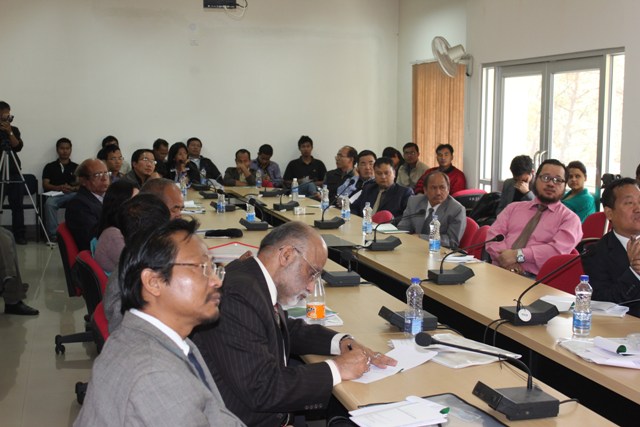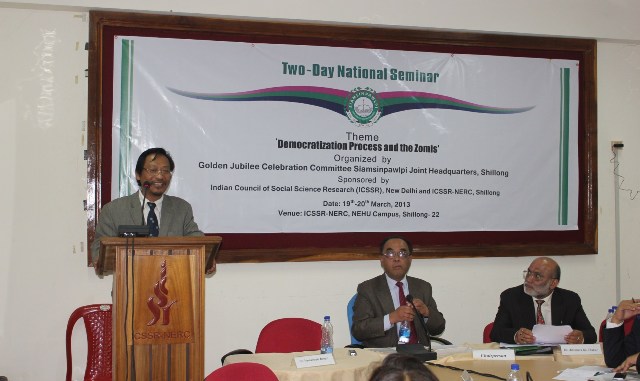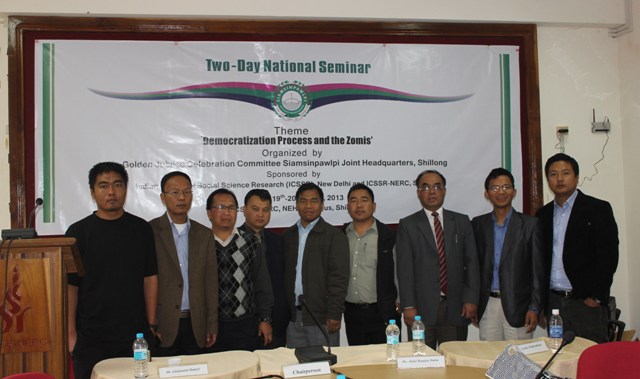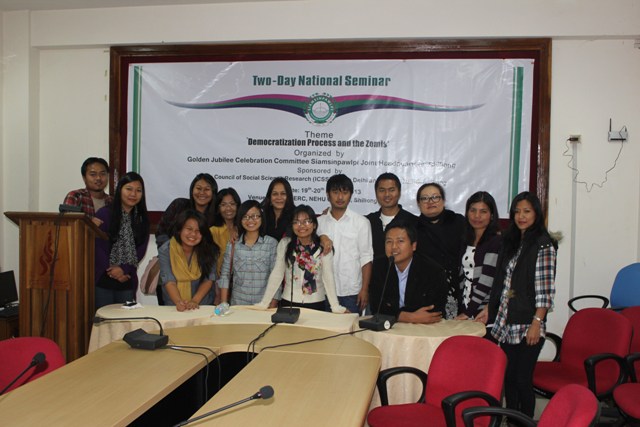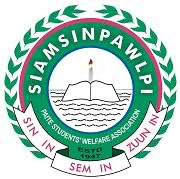 PRESS RELEASE
PRESS RELEASE
Dated Shillong, the 22nd March, 2013
NATIONAL SEMINAR ON “DEMOCRATIZATION PROCESS AND THE ZOMIS” ORGANIZED BY SIAMSINPAWLPI (SSPP) JOINT HEADQUARTERS, SHILLONG
Siamsinpawlpi (SSPP), Joint Headquarters, Shillong was established on October 2, 1963 by Paite college students studying in Shillong at that time with the patronage of some officers and service personnel serving in Shillong. As part of its Golden Jubilee Celebration, SSPP Joint Headquarters, Shillong organized a two-day National Academic Seminar on “Democratization Process and the Zomis” at ICSSR-NERC, NEHU Campus, Shillong from March 19-20, 2013.
The Seminar was inaugurated by Mr. Toki Blah, IAS(retd) & President, ICARE Shillong and followed by the welcome remarks of Sh. T. K. Hangzo, IDAS, Chairman GJCC. Eminent Scholars, noted writers, faculty members from various universities, SSPP Advisers, Officers and students leaders, Research Scholars participated in the seminar. The seminar is sponsored by Indian Council of Social Science Research, New Delhi and ICSSR-NERC, Shillong. The seminar which focuses on encouraging discussion on democratic institutions and democratization process among tribal societies in NE Region has brought to the fore varied ideas of scholars, academicians, bureaucrats and student leaders through the 4(four) Academic sessions. Through this seminar it is also hoped that the intellectual base for scholarship on the Zomis would eventually be created. It will also serve as the beginning of a process for linkages with academic institutions of the region.
Democratization process among the Zomis started in the modern sense with the introduction of colonial administration. Chieftainship was a well-established institution in the Zo society. The chief was not only a political leader but he also held a pivotal position in the socio-economic and religious life of the people. Due largely to its position and influence in the society, the chief, not the people, became the main focus of the British when they sought to establish their rule among the Zomis.
The two-day seminar consisted of the following 4(four) Academic Sessions:
Session-I:
i) “Gender in the Zomi Society: An anthropological perspective”
(Dr. Lucy Zehol, Associate Professor, Department of Anthropology, NEHU, Shillong)
ii) “Gender Equality among the Zomis”
(Dr. Tara Manchin Hangzo, An Independent Health Consultant)
iii) “Democratization Process and the Zomis: A gender perspective”
(Ms. Ninglun Hanghal, Freelance Journalist, Delhi)
Session-II:
i) “Debating Slavery: Nature and abolition in the Zomi area”
(Dr. A. K. Thakur, Associate Professor, Department of History, NEHU, Shillong)
ii) “Social Formation of the Zo Tribes”
(Dr. V. Rengsi, Associate Professor, Department of History, NEHU, Shillong)
iii) “Promoting Democracy and Peace Education in the North East India”
(Dr. Leban Serto, Coordinator, Department of Peace Studies, Martin Luther Christian University, Shillong)
Session-III:
i) “Challenges of democratization process in India’s North East”
(Prof. Dr. Ginlianlal Buhril, Director Corporate Governance, Universal Business School, Mumbai)
ii) “Identity Politics and Process of Democratization: Emerging trends in Northeast India”
(Dr. Akhil Ranjan Dutta, Associate Professor, Department of Political Science, NEHU, Shillong)
iii) “Identity Issues and the Emerging Reality in North East India”
(Dr. Gorky Chakraborty, Associate Professor, Institute of Development Studies, Kolkata)
Session-IV:
i) “State, Tribe, and Democracy: The Zomi cause”
(Dr. H. Kamkhenthang & Dr. Asok Kumar Ray)
ii) “Colonialism vs Chieftainship: The making of colonial ‘agent’ in Chin Hills”
(Dr. Pum Khan Pau, Associate Professor, Department of History, Visva Bharati University, Santiniketan)
iii) “Development Perspective vis-à-vis Ethnic Aspirations (with special emphasis to Manipur)”
(Mr. Valte Vungzamuan, IRS)
- Golden Jubilee Celebration Committee
Siamsinpawlpi Joint Headquarters, Shillong
